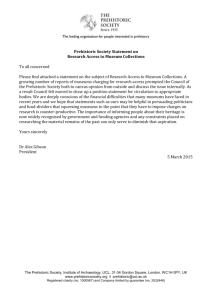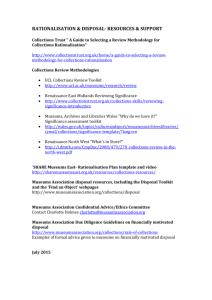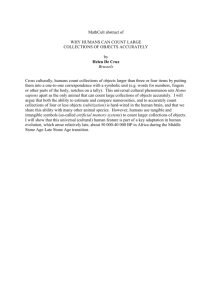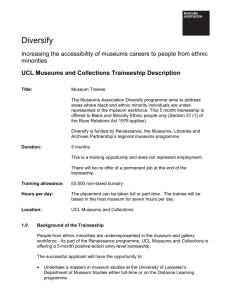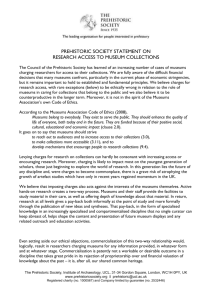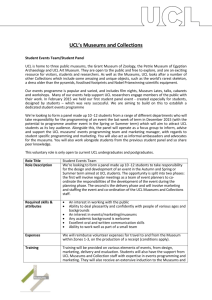The Panopticon: UCL`s Collections Centre
advertisement
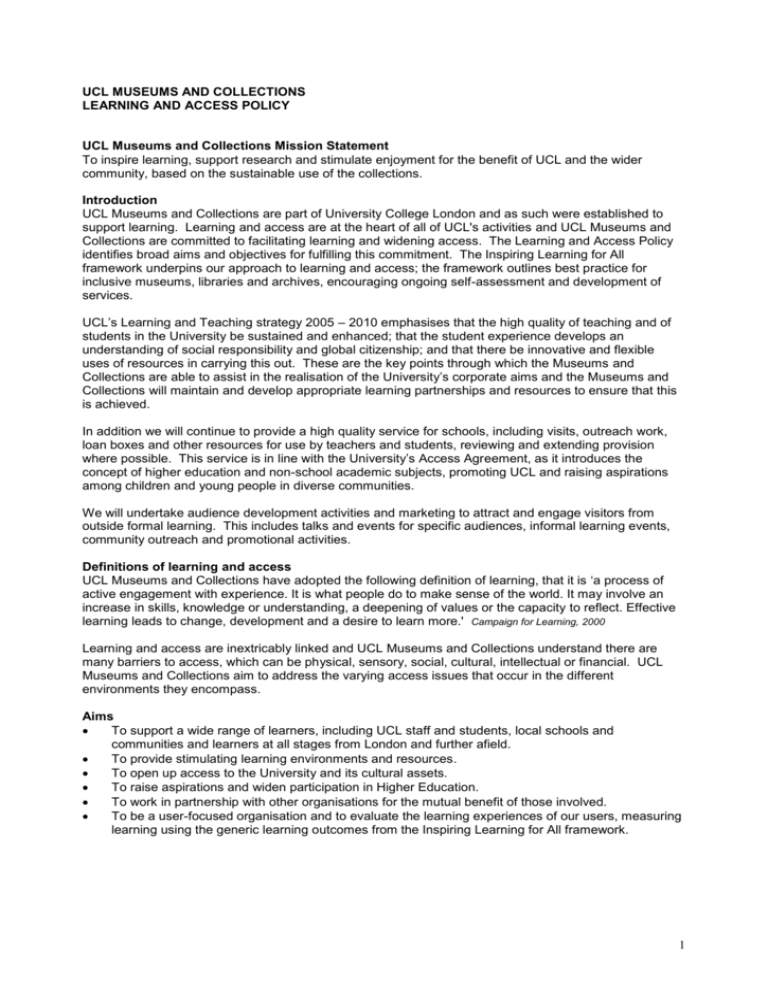
UCL MUSEUMS AND COLLECTIONS LEARNING AND ACCESS POLICY UCL Museums and Collections Mission Statement To inspire learning, support research and stimulate enjoyment for the benefit of UCL and the wider community, based on the sustainable use of the collections. Introduction UCL Museums and Collections are part of University College London and as such were established to support learning. Learning and access are at the heart of all of UCL's activities and UCL Museums and Collections are committed to facilitating learning and widening access. The Learning and Access Policy identifies broad aims and objectives for fulfilling this commitment. The Inspiring Learning for All framework underpins our approach to learning and access; the framework outlines best practice for inclusive museums, libraries and archives, encouraging ongoing self-assessment and development of services. UCL’s Learning and Teaching strategy 2005 – 2010 emphasises that the high quality of teaching and of students in the University be sustained and enhanced; that the student experience develops an understanding of social responsibility and global citizenship; and that there be innovative and flexible uses of resources in carrying this out. These are the key points through which the Museums and Collections are able to assist in the realisation of the University’s corporate aims and the Museums and Collections will maintain and develop appropriate learning partnerships and resources to ensure that this is achieved. In addition we will continue to provide a high quality service for schools, including visits, outreach work, loan boxes and other resources for use by teachers and students, reviewing and extending provision where possible. This service is in line with the University’s Access Agreement, as it introduces the concept of higher education and non-school academic subjects, promoting UCL and raising aspirations among children and young people in diverse communities. We will undertake audience development activities and marketing to attract and engage visitors from outside formal learning. This includes talks and events for specific audiences, informal learning events, community outreach and promotional activities. Definitions of learning and access UCL Museums and Collections have adopted the following definition of learning, that it is ‘a process of active engagement with experience. It is what people do to make sense of the world. It may involve an increase in skills, knowledge or understanding, a deepening of values or the capacity to reflect. Effective learning leads to change, development and a desire to learn more.' Campaign for Learning, 2000 Learning and access are inextricably linked and UCL Museums and Collections understand there are many barriers to access, which can be physical, sensory, social, cultural, intellectual or financial. UCL Museums and Collections aim to address the varying access issues that occur in the different environments they encompass. Aims To support a wide range of learners, including UCL staff and students, local schools and communities and learners at all stages from London and further afield. To provide stimulating learning environments and resources. To open up access to the University and its cultural assets. To raise aspirations and widen participation in Higher Education. To work in partnership with other organisations for the mutual benefit of those involved. To be a user-focused organisation and to evaluate the learning experiences of our users, measuring learning using the generic learning outcomes from the Inspiring Learning for All framework. 1 Objectives To support a wide range of learners, including UCL staff and students, local schools and communities and learners at all stages from London and further afield. UCL Museums and Collections’ marketing strategy identifies our potential audiences as:UCL community (students, staff and hospitals) Schools (Primary and Secondary) Local community (Camden residents) Life-long learners Special interest groups Students and staff from Higher Education organisations Tourists and non-local day visitors The UCL community and schools are the two groups targeted in order of priority, with each collection having its own specific audiences in addition. UCL’s collections have an important use for teaching and research. The Museums and Collections aim to raise their profile within UCL, reviewing current use by staff and students in related departments and investigating their potential for interdisciplinary use in the wider University. This will also be achieved through the provision of informal learning events fro staff and students and their families. To provide stimulating learning environments and resources. We will provide a wide range of services and resources to inspire and support learning, expanding existing activities and experimenting with new approaches, in line with two of the four key principles of the Inspiring Learning for All framework, “creating inspiring and accessible learning environments” and “providing more effective learning opportunities”. This includes provision for teaching and learning on specific University courses, including direct teaching by Museums and Collections staff, dissertation supervision and professional guidance, and the use of objects in course practicals. Services include permanent displays, temporary exhibitions, direct access to research materials, handling sessions, guided tours, lectures, loan boxes, individual object loans, travelling exhibitions, teachers' packs, on-line resources, enquiry services, family activities, study days for lifelong learners, conferences, summer schools, opportunities for participation and volunteering, collaborations with artists, drama and role play sessions, storytelling, activity sessions, and a range of publications, including newsletters and catalogues. In addition to staff time and a revenue budget, learning will be supported through the work of volunteers and Friends groups, through grants and sponsorship. We will provide physical facilities, in conjunction with the University, that enhance users’ experience of the museums and collections and balance the physical needs of collections with visitors’ needs. To open up access to the University and it cultural assets. Physical & sensory access UCL actively seeks to makes its collections and buildings more accessible to as wide a range of users as possible, including those with special needs. It has a Disability Co-ordinator and an IT trainer for students with disabilities and is a member of SKILL, the Adult Dyslexia Association, and the British Computer Society Disability Group. An access audit has been carried out and adaptations will be made where appropriate. We aim to relocate as many as possible of the Museums and Collections to more modern accessible premises. We aim to develop total physical access to collections on demand. A rolling programme of temporary exhibitions will provide access to material in store. Opening Hours Opening hours have recently been extended and we are committed to maintaining and where possible extending opening hours. Collections are also accessible outside of opening hours, subject to appointment, and this will be well-advertised to potential visitors. 2 Cultural Access We will work to remove cultural barriers to using the Museums and Collections. This encompasses working with specific communities, such as the Petrie Museum’s work through African-Caribbean and Egyptian outreach officers; providing information and services of interest to specific cultural groups and in languages other than English. Intellectual access UCL Museums and Collections aim to provide intellectual access to as wide a range of users as possible. We will do this by evaluating display concepts and text, publicity material, publications before they are finalised, with a range of users, as part of our commitment to developing a user-focussed service. We will also seek to adopt a range of communication methods in the permanent exhibitions and temporary displays. Enquiries about the collections are answered free of charge and we will provide timely responses to requests for information under the Freedom of Information Act, indicating where charges need to be made in line with guidance from UCL’s Freedom of Information Officer. Financial access We will maintain free public access to the Museums and Collections and the resources within them. We aim to offer free services to our target audiences; other groups may be charged at cost and some services charged at commercial rates. Tours for school groups are free. A tiered policy of charging is made for services such as new photography or filming, in accordance with University regulations, and reproduction from existing negatives, depending on the status of the user and the end use. Each case is decided on an individual basis, but broadly the policy is that academic uses (private study, publication in academic works) will be charged at cost, while commercial users are charged at a higher rate. In addition, object loans within the UK are free, while work servicing international object loans requests is charged for at cost, as detailed in the document 'Loans Policy for UCL Collections'. Digital Access UCL Museums and Collections has a website that will provide information on all collections, and resources such as education pages, providing virtual access to collections where possible. The website will be used to publicise events and temporary exhibitions and to make collections’ policies and strategic plans available to the public. The website will be designed to be easily accessible and stimulating with a high visual content. Content will be kept up-to-date and we will implement a content management system to enable collections staff to update their own areas of the site. To raise aspirations and widen participation in Higher Education. The use of university collections both to deliver specific educational programmes in schools and colleges and to raise aspirations about higher education provides a new role for university collections. UCL Museums and Collections will provide learning opportunities for students from a wide range of backgrounds, particularly from groups currently under-represented nationally: state school/college students, students from socio-economic groups IIIM, IV and V, students from low-participation neighbourhoods, students with disabilities, mature students, and ethnic minority students. This is in line with the aims of UCL’s Widening Participation Unit. To work in partnership with other organisations for the mutual benefit of those involved. The Museums and Collections will continue to be involved in partnership working with other museums, libraries and archives and other agencies in the local and international community. To be a user-focused organisation and to evaluate the learning experiences of our users, measuring learning using the generic learning outcomes from the Inspiring Learning for All framework. UCL is committed to developing a user-focussed service for the internal and external users of its museum and library collections. The Museums and Collections undertake quantitative and qualitative research work on the interests, needs and comments of existing and potential users and act upon it accordingly. We will analyse our actual and potential audiences, and involve them in the development of our services. 3 We will develop the use of the generic learning outcomes from the Inspiring Learning for All framework in formative and summative evaluations of all services and further use these to inform future projects at the planning stage, embedding the learning outcomes in all planned activity. The generic learning outcomes are measured in 5 areas:Knowledge and understanding Skills Attitudes and values Enjoyment, inspiration, creativity Activity, behaviour, progression Users’ experiences of our services may be measured under one or more of these headings and outcomes planned according to which of these areas services will deliver. The generic learning outcomes will become a tool for evaluation and planning across the collections. Related issues Staff Development We are committed to ensuring that our staff are prepared for the tasks demanded of them. The key to supporting learning and access is to have an enthusiastic, motivated and well-managed team of people with a clear set of objectives. UCL Museums and Collections are committed to developing current staff and volunteers and to recruiting new staff and volunteers of high calibre and from a greater cultural diversity. Staff and volunteers will be provided with opportunities for continuing professional development with the support of UCL's internal staff development and training team, as well as through access to external opportunities as appropriate. A staff training audit will be carried out on a regular basis and training needs addressed. We will recruit, train and manage volunteers to the highest standards to ensure excellent service and the development of transferable skills [see UCL Museums and Collections Volunteer Policy]. Note on policy and other strategic documents Aims for individual collections are recorded in UCL Museums and Collections strategic plans, which are reviewed regularly. Each museum/collection will be responsible for implementing and reviewing these aims, using individual action plans as needed. Details of individual collections’ plans and activities are not given as part of the overarching Learning and Access Policy [see UCL Museums and Collections Strategic Plans 2005-2008 for further details]. 4

